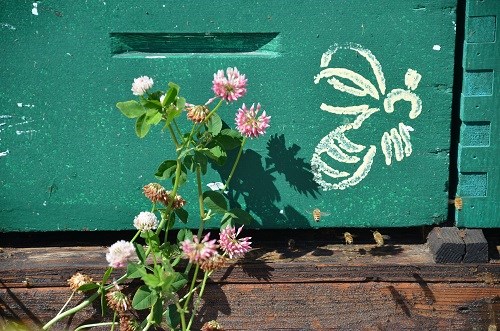New Westminster is sweet on the honeybee.
The City of New Westminster has proclaimed May 29 to be the Day of the Honeybee in New Westminster – a day aimed at bringing attention to the health and well-being of the honeybee.
Leanne Buhler, manager of the Honeybee Centre in Surrey, said honeybees are an important part of the ecosystem and are responsible for pollinating one-third of food consumed but have been threatened by environmental changes and increasingly intensive farming practices needed to feed the population.
“This is certainly going to be a serious environmental problem,” said Coun. Lorrie Williams. “I don’t think the world is aware yet of the importance of the honeybee for food production.”
Williams said she’d love for New Westminster to become a “bee friendly city” and suggested council refer the issue to the city’s environment coordinator.
Buhler said the Day of the Honeybee is an opportunity to bring education and inspiration to others about the issue and to discuss ways people can help honeybees.
“Plant a bee-friendly garden,” she said of her number 1 tip. “What that means is planting a variety of plants and foliage that will bloom throughout the year – as early as possible in the spring and all the way to the latest possible date in the fall. That gives the bees tons of food to drink throughout the season, not just at a certain time of year.”
Buhler’s second tip is to give bees a little bit of water by providing a shallow water dish with rocks, so bees and other pollinators can land safely and drink water.
“My number 3 is, don’t cut the dandelions. That’s because it’s the first food,” she said. “Oftentimes bees are very, very weak at the beginning of the season. If they come out and they’ve only got so much effort to go and find food, if they can’t find those dandelions within a certain distance, it may mean life or death for the colony. They really are important.”
New Westminster resident John Gibeau founded the Honeybee Centre, which provides products and services related to beekeeping, as well as a visitor centre and retail store.
The Day of the Honeybee is part of the Honeybee Centre’s new community bee garden project, said Buhler of the project being offered in Surrey but applicable to other cities.
“What we are doing is bringing 10-by-10 garden plots and setting them up around the City of Surrey on private and public properties. They are planted full of seasonal foliage – something that grows throughout the season. Each garden has two honeybee colonies and a variety of nesting materials for native pollinators like mason bees and bumblebees,” she told the Record. “Our goal is to put 100 colonies in the City of Surrey to pollinate the local flowers and also to provide education and connect different communities and different people that are doing great things for honeybees and honeybee health.”
The project also aims to educate people about these important insects.
“A lot of businesses are still skeptical about having bees close by to the public. That’s part of the benefit of having these colonies in the city and in public places – to reduce that fear and bring education that bees are good,” she said. “They are here anyways – they are just a bit more obvious than you’re used to.”
Bee facts:
* Honeybees are close relatives of wasps and ants.
* Honeybees are found on every continent on earth, except for Antarctic.
* Bees of all varieties live on nectar and pollen.
* It’s estimated one-third of the human food supply depends on insect pollination. Without bees, pollination would be difficult and time-consuming.
* Bees have a long, straw-like tongue called a proboscis that allows them to drink the nectar from deep within blossoms.
* Honeybees are social insects and live in colonies consisting of a single queen, a few hundred drones and thousands of worker bees.
* A typical honeybee colony has 50,000 to 80,000 bees. A fully fertile queen bee lives four to seven years, compared to about 45 days for a worker bee.
Facts courtesy of Honeybee Centre



